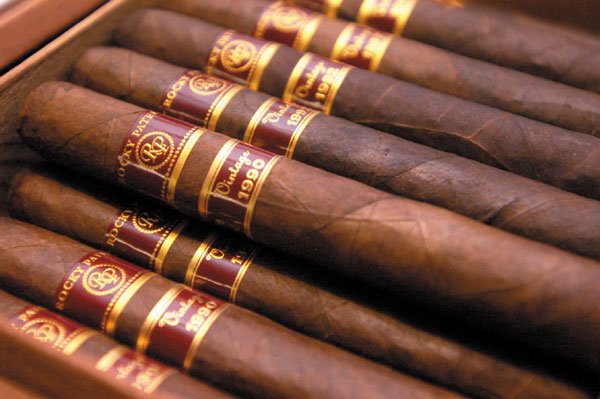Tobacco patrons and profiteers alike will face more opposition
toward their tobacco use
Gilroy – “Aroma,” “balance,” “fermentation” and other staple terms from the aficionado’s lexicon floated through the air last week in a small Morgan Hill storefront, but the chatter was not about a new Pinot Noir or favorite Zinfandel.
Faithful patrons of the Morgan Hill Tobacco Company last Wednesday doted over hand-wrapped cigars the way wine enthusiasts savor an exceptional vintage. And with equal passion they railed against Proposition 86, a statewide tobacco tax on the Nov. 7 ballot that threatens to shutter their smoke-filled haven.
In addition to tacking a $2.60 excise tax on a pack of cigarettes and doubling the price of cigars and other tobacco products, opponents say the law would require smoke shops to pay a “floor tax” equaling 88 percent of the value of their inventories.
Shop owner Wyatt Miller said he already pays an “extortion-like fee” in the form of a 47 percent tax on all products that enter his store. He said the new tax would be crippling. Though he remained hopeful that he would survive if the proposition passes, he admitted he does not have “$88,000 sitting in the bank” for a floor tax. He would not reveal the value of the tobacco in the humidors and glass cases at the front and back of his store, but he said it was more than $100,000.
Even more than the one-time hit from the floor tax, Miller fears that the proposition would shatter the social network that has nurtured his business in the last nine years.
“If it passes, it will drive some customers to seek less expensive alternatives – and that doesn’t mean California,” Miller said. “Those customers I lose will be people buying cigars illicitly. It will create a black market. It’s very similar to Prohibition – states lost tax revenue and crime went up.”
Patrons puffing on Davidoff cigars – the featured brand during last week’s cigar-of-the-month club meeting – confirmed that they would change their smoking habits.
“That cigar out there is a great smoke,” said Joe Baez, pointing to a Zino Platinum on the pool table near the bar, “but people aren’t going to buy it here.”
Bob Russell, a Gilroy resident who has been going to the shop for six years, said he usually smokes five or six cigars a week, though he smokes that many in two days when he goes fishing. He polished off a box of 20 cigars during a recent 10-day fishing trip in Alaska.
“We’re all going to have to cut back. We’ll have to survive,” Russell said, though he predicted that Miller’s smoke shop and others like it are “going to go out of business.”
Peg Fordney said she would rather quit smoking cigarettes than pay an additional $2.60 per pack, but she still worried about the fate of the smoke shop.
“The majority of our friends we met here,” Fordney said. “Twice a month we have events. We invite each other to barbecues, weddings.”
Steve Stratton called it “an ideal model of a social cigar smoking shop. The social network that would be destroyed is huge.”
Stratton and other cigar enthusiasts were careful to distinguish themselves from cigarette smokers, for whom smoking, they said, is a path to nicotine. They said cigars pose less of a health threat than cigarettes because they contain less nicotine and because they are not supposed to be inhaled. Some argued that second-hand smoke has not been definitively shown to cause health problems.
“I’m neutral on what goes on with cigarettes,” Sean Kenny said. “Cigars – they’re a different thing. To me, it’s not the nicotine industry.”
Supporters of Prop. 86 say the law, if approved by a majority of state voters in November, will raise $2.1 billion annually for hospitals and health programs across the state. Opponents point to a state analysis that says revenues are uncertain given the unpredictability of consumers when faced with such a large tax hike.
Miller, who also owns a tobacco shop in Monterey, predicted that most of his customers would start buying cigars online or from nearby states.
“Cigar smoking is an adult past time, and most people who smoke cigars like the camaraderie of it, the social aspect of other adults,” Miller said. “I feel like it’s a different animal than cigarettes and Prop 86 unfairly combines the two. And that’s the real pity, because cigarettes are harmful, addictive and habit-forming.”














